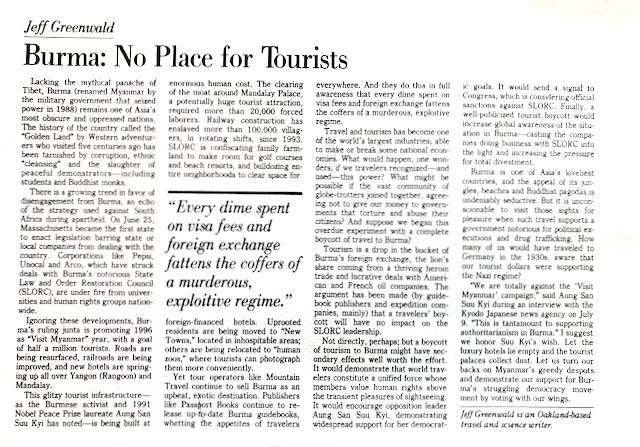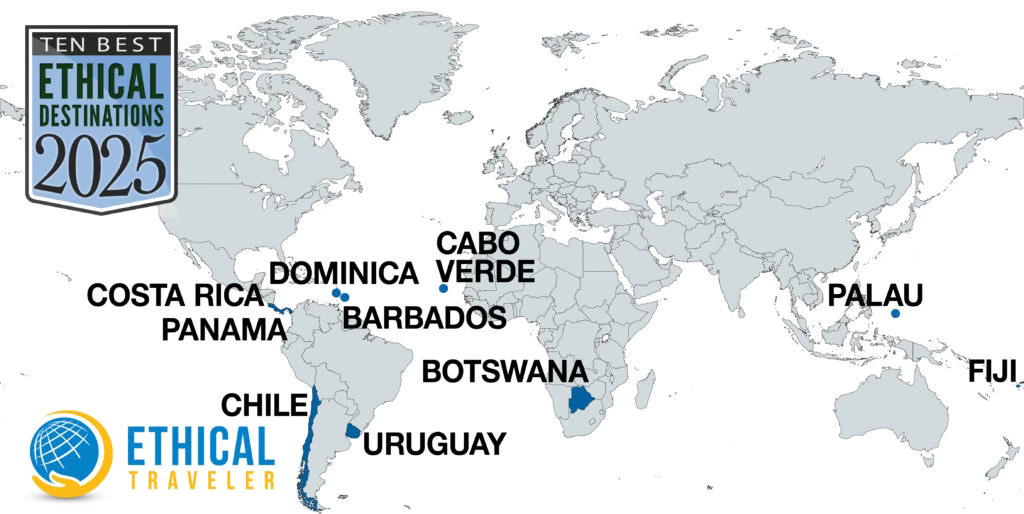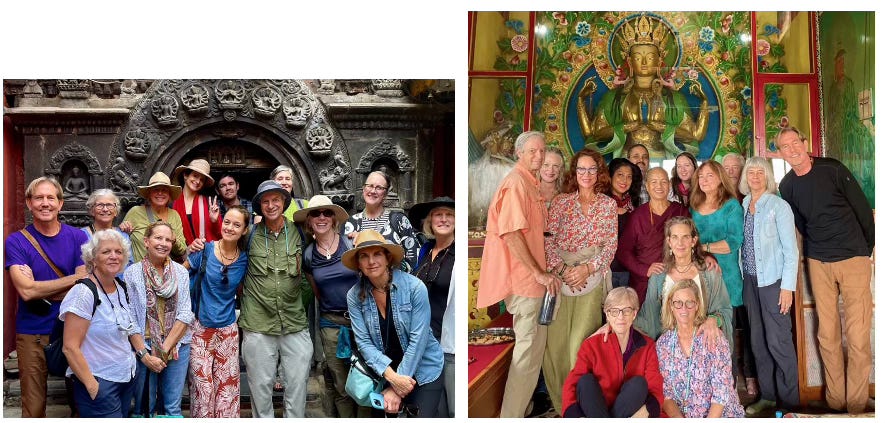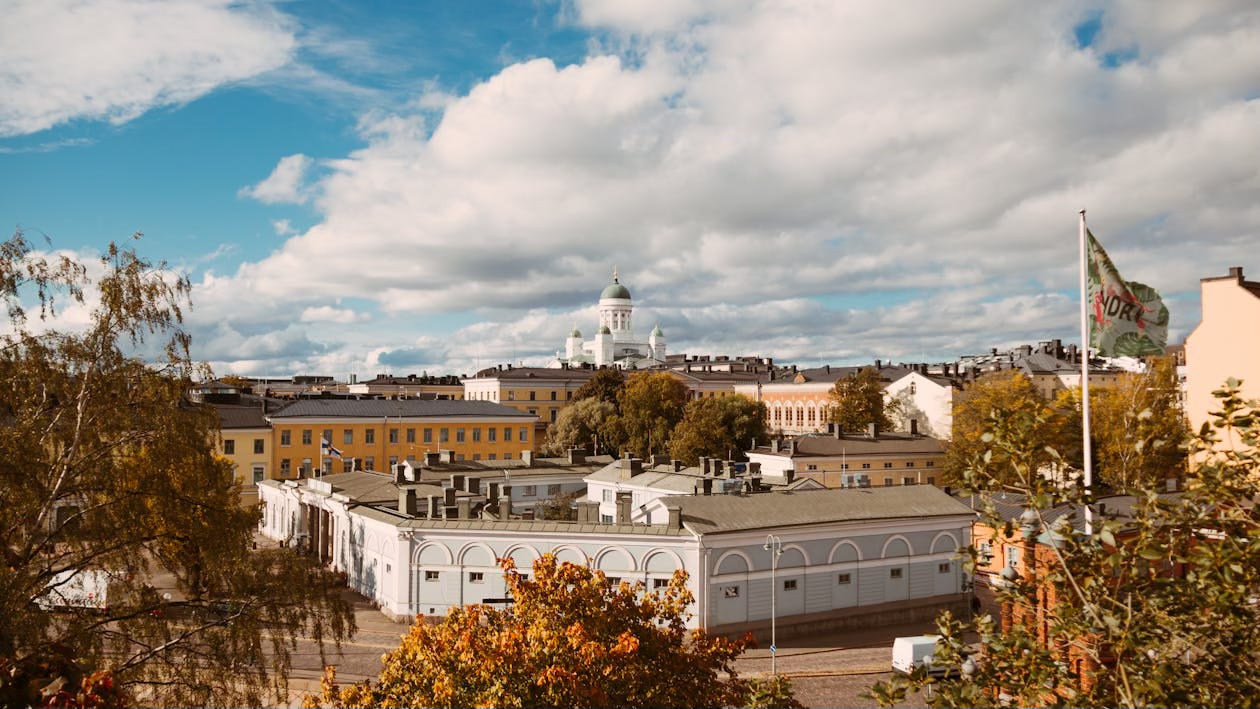First of all I'd like to say THANK YOU to those of you who are paid subscribers to Jeffji’s Big World. You are the reason I am able to do this every other week, despite my for-hire writing and health challenges. To those of you who are free subscribers, I love you too. But it feels sort of unrequited. Please help support these posts!
Okay, on to what really matters.
Almost 30 years ago, in 1996, Aung San Suu Kyi — the democratically elected leader of Burma (now called Myanmar) — made an unusual request. She asked that tourists not visit her much-loved country, as the foreign currency they spent on tourist visas, hotels and in-country flights literally paid for the weapons and bullets used by the fascist military junta to kill Burma’s passionate pro-democracy protesters.
In July of 1996 I published an op-ed in the Washington Post which I ended with this note: “I suggest we honor Suu Kyi's wish. Let the luxury hotels lie empty and the tourist palaces collect dust. Let us turn our backs on Myanmar's greedy despots and demonstrate our support for Burma's struggling democracy movement “by voting with our wings.” (Aung San Suu Kyi remains under house arrest.)
It occurred to me then, and I believe today, that travel and tourism can be an immensely effective lever for social and political change. Nine years after my op-ed was published, I met three like-minded activists during an author event at a Bay Area bookstore. Together, we launched a nonprofit called Ethical Traveler. We began as a political action group, noting abuses in countries like Nepal (the repatriation to China of Tibetan refugees) Australia (the deforestation of Tasmania) and Namibia (the sanctioned slaughter, by furriers, of baby seals) and sending letters to their Ministers of Tourism.
“We are taking note of your (environmental and/or human rights) violations,” stated the hundreds of letters from Ethical Traveler’s members, “and want you to know that we have a choice of which countries we visit. Unless you end these practices, we will find other places to spend our tourist dollars.”
Over the years, and after some measure of success, our tactics evolved. We learned that a carrot is a more effective incentive than a stick. Rather than letter writing campaigns that threatened countries with a tourism embargo, we began to research and publish lists of the best countries for travelers to visit, particularly in the developing world: countries where human rights, social welfare, environmental stewardship and even animal rights were respected. Though no nation is perfect, we were able to find 10 countries a year where the leadership and citizens are “doing the right thing;” destinations that endorse best practices, and seem to be moving along an arc towards steady improvement.
Our now bi-annual report — “The World’s Ten Best Ethical Destinations” — soon gained traction, and our list was published in newspapers and media outlets around the world.
In early March we announced our 2005 Best Ethical Destinations winners. We made some surprising discoveries, and I hope you’ll give it a read. If you’re a curious wanderer with an urge to get off the beaten path, one of these destinations might be just the place for you. Tell ‘em that Jeff sent you.
Back in 2003, when I founded Ethical Traveler, I was hale and hearty. Travel was at the center of my life; it felt like the most fulfilling way to spend my tenure on Earth. As a reasonably successful travel journalist, I was able to visit many places that interested me, simply by asking the right editor at the right magazine or newspaper. It was a peripatetic life, and I'm glad I led it.
But that life, with its carefree sense of adventure and openness to anything and everywhere, is ending.
Just last night I was at a wonderful dinner party hosted by my close friend and colleague Laurie Wagner, with whom I lead trips to Nepal every November as part of the Himalayan Writers Workshop. The dinner was a partial reunion of friends old and new who had traveled together as part of the HWW in 2023 and 2024. Experiencing those writing intensives in Nepal cemented a strong bond between us. Though only a couple of weeks long, the workshops are intense; a time of immersion in an unfamiliar culture, great gulps of learning, and intimate shared self-expression.
While it was easy to reminisce about our encounters and adventures in the Kathmandu Valley, it was far less comfortable for me to listen to everyone’s future travel plans. During such conversations I find myself joining the conversation and talking about the places I hope to go — Florida at the end of June, Paris in the fall, and Nepal again in November – without allowing in the truth that every month is getting a little bit little more difficult; more challenging to walk down the block to the storage area for my eBike, never mind climbing the 365 steep steps to the Monkey Temple, or spending an afternoon strolling along the Seine.
Yes, I keep up a good patter and pride myself on my chatter — as if the fact of Parkinson’s doesn’t matter.
The truth is that I’m living in a state of magical thinking, surrounded by an aura of hope familiar to anyone who practices it: the belief that thinking magically is sometimes the only route to manifesting an unlikely, or impossible, outcome. There have been some good outcomes: Recently I had lunch with a friend who offered, by dint of his innate generosity and astonishing number of loyalty miles, to find me a nice hotel in Paris at very low (or no) cost, or even a business class seat (albeit via stopover in Helsinki or such) to France.
But the main incentive is this: I'm an honest guy. So if I tell myself (and my friends) I’m going, then I’m going… And the creeping notion that I will not be comfortable going, or that my body literally will not let me go, or that this will be my last time going anywhere, are aborted from my consciousness as devils of negativity that are useless, possibly false, and definitely self-defeating.
As my fellow PD people know: What we are capable of changes hour by hour. Given this awkward blueprint, my baseline assumption is that I will be capable of doing what I wish at any given time in the future. Any given day, any given week, any given month.
Sometimes, with Parkinson's, there's a very thin line between self-confidence and delusion. I’m very aware that my days of being able to act by the above principal are limited. But as long as I can drag myself from point A to point B, I’ll continue to do so, and feel gratitude for sidestepping the black hole of future inevitables. What are the inevitables? Unless the NIH comes back online, I guess I’m gonna find out.
In the meantime, I will keep traveling. Yes to Florida in a couple of weeks; yes to Paris; yes to Nepal. And though accepting the offer of a business class seat on a flight across the Atlantic (with a stopover in Helsinki) is the opposite of ethical travel (although not as bad as taking a cruise ship almost anywhere), I’m going to let myself off the hook this time. I mean, the rest of this lifetime. Because if any time might be the last time (add FAA to NIH), I definitely want my last memories of being on a Jumbo jet to include bourbon and chocolate.
We live in a world where privilege is seldom manifested ethically. But so much about Parkinson’s involves forgiving yourself, again and again. And in terms of behaving badly I'm pretty sure I have bigger fish to fry.
This post is dedicated to the memory of Charles Gay (1946 - 2025):
Explorer, Buddhist, Biker, Friend











Aw, man, Jeff — so straight, so raw, so touching! Your body may be betraying you, but you seem strong as ever to me on the page…❤️🙏
Keep on truckin’, Jeff. As much as you can. Loved the first half of this post for obvious reasons (and was very moved by the second half).